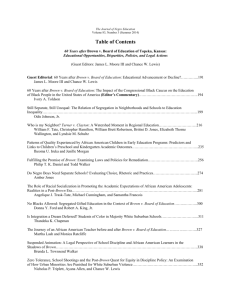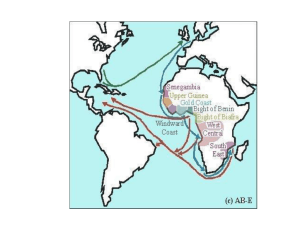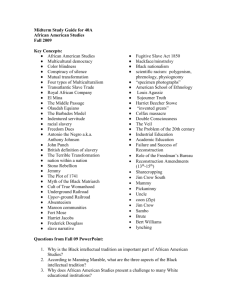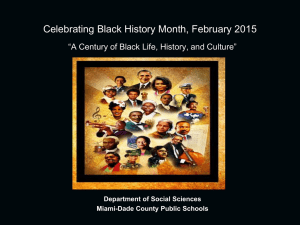Dr. Carter G. Woodson & the Origins of Multiculturalism University Club Luncheon
advertisement
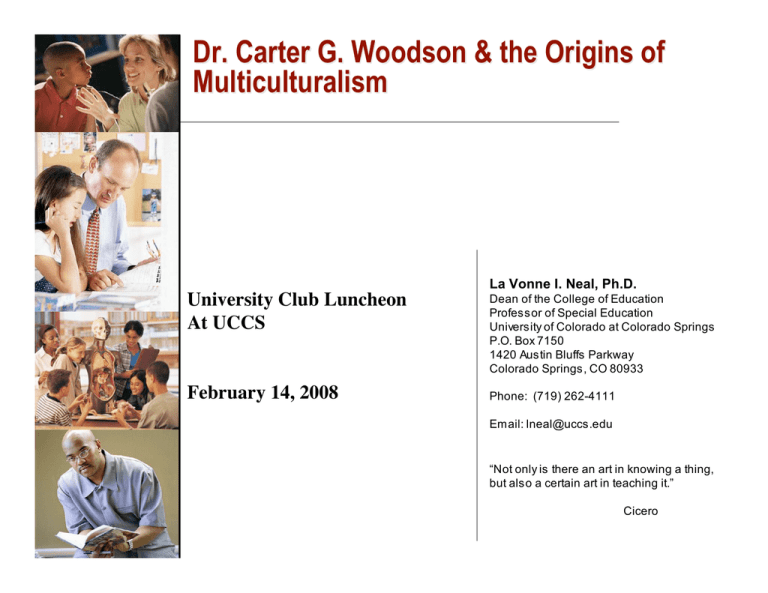
Dr. Carter G. Woodson & the Origins of Multiculturalism University Club Luncheon At UCCS February 14, 2008 La Vonne I. Neal, Ph.D. Dean of the College of Education Professor of Special Education University of Colorado at Colorado Springs P.O. Box 7150 1420 Austin Bluffs Parkway Colorado Springs, CO 80933 Phone: (719) 262-4111 Email: lneal@uccs.edu “Not only is there an art in knowing a thing, but also a certain art in teaching it.” Cicero Agenda I. Landscape of College Readiness in Colorado II. Colorado’s Vision for Education III. Dr. Carter G. Woodson III. Mis-Education of the Negro Welcome to school... Landscape of College Readiness in Colorado 2005-06 U.S. Rank Funding for Higher Education Overall: 48th Source: State Accountability Report 2005-2006 Landscape of College Readiness in Colorado 2005-06 U.S. Rank H.S. Graduation Rates Overall: 25th Hispanic American: 42nd African American: 28th Source: State Accountability Report 2005-2006 Landscape of College Readiness in Colorado 2005-06 U.S. Rank College Enrollment Rates Overall: 23rd Minority Participation: 48th Low-income Participation: 35th Source: State Accountability Report 2005-2006 Vision “I want more of our students to consider college and posthigh school training as viable options after graduation--and I want them to be fully prepared for those opportunities” Colorado Governor, Bill Ritter Vision Fulfilling the Colorado Promise • Reduce dropout rate by 50% • Double the participation in postsecondary education & training Achievement Gap The Nadir for Student Achievement: • Schott Foundation Report National graduation rate for African American males and Hispanic American males = 46% The Mis-Education of the Negro Dr. Carter G. Woodson: Biography: • Born 1875 • Ph.D. from Harvard • 1915 formed the Association for the Study of Negro Life and History now National Association for the Study of African American Life and History (ASALH) • ASALH website: www.asalh.org The Mis-Education of the Negro Dr. Carter G. Woodson: Biography: • 1926 established Negro History Week now Black History Month • 1933 published the book, The Mis-Education of the Negro • 1937 established the Negro History Bulletin now the Black History Bulletin (BHB) • Died in 1950 The Mis-Education of the Negro The Mis-Education of the Negro (1933): “The same educational process which inspires and stimulates the oppressor with the thought that he is everything and has accomplished everything worth while, depresses and crushes at the same time the spark of genius in the Negro by making him feel that his race does not amount to much and never will measure up to the standards of other people.” Dr. Carter G. Woodson 1933 The Mis-Education of the Negro •“If you can control a man’s thinking you do not have to worry about his action.” action •“If you make a man feel that he is inferior, you do not have to compel him to accept an inferior status, for he will seek it himself.” •“If you make a man think that he is justly an outcast, you do not have to order him to the back door. door He will go without being told; and if there is no back door, his very nature will demand one.” Dr. Carter G. Woodson 1933 The Mis-Education of the Negro “We do not mean to suggest here, however, that any people should ignore the record of the progress of other races. We should not advocate any such unwise course. We say, hold on to the real facts of history as they are, but complete such knowledge by studying also the history of races and nations which have been purposely ignored” Dr. Carter G. Woodson 1933 Woodson observed how Jim Crow Segregation affected the psyches of African Americans, young . . . Drinking fountain on the courthouse lawn, Halifax, North Carolina. 1 938. . . . and old At the bus station, Durham, North Carolina. 1 940. Students of the 21st Century •By now, schools should understand that there is still a need to enhance student engagement in learning by showing the relevance of African American history and culture on their present-day lives. •*By now, schools should understand the impact slavery and oppression has on our students’ ability to achieve. •*Example: Post-Traumatic Slave Syndrome by Joy DeGruy Leary,! Ph.D. – examination of the slavery which still exists despite its legislative endings and explores the failures of the education system in its historical depiction of slavery and the impact it still has on both the black and white cultures of today. Crippling Obstacles of Slavery Dr. Joy DeGruy Leary: Biography: • Assistant Professor of Social Work at Portland State University Describes the crippling obstacles of slavery as Post Traumatic Slave Syndrome Post Traumatic Slave Syndrome • Quantitative & Qualitative Research • Theory that explains the etiology of adaptive survival behaviors in African American communities Post Traumatic Slave Syndrome • Multigenerational trauma together with continued oppression • Absence of opportunity to heal or access benefits available in society leads to • Post Traumatic Slave Syndrome M+A=P Post Traumatic Slave Syndrome (PTSS) Dr. Joy DeGruy Leary: “African Americans sustained psychological and emotional injury as a direct result of slavery and continue to be injured by traumas caused by the larger society’s policies of inequality, racism and oppression. Post Traumatic Slave Syndrome (PTSS) Dr. Joy DeGruy Leary: A less severe form of violence and abuse continued after slavery officially ended with peonage, Black Codes, Convict Leasing, lynchings, beatings, threats of life and property, the rise of the Klan, Jim Crow segregation, the death of Emmett Till, the race riots of the 1960s, the 1989 beating death of Mullageta Sera (an EthiopeanAmerican) by white supremacists groups, Post Traumatic Slave Syndrome (PTSS) Dr. Joy DeGruy Leary: the near election of an ex-Klansman to governor of the state of Louisiana, the 1992 police beating of Rodney King, the 1999 dragging death of James Byrd in Jasper, Texas by four white youth, the police shooting death of Amadou Diallo in 1999, and the 2002 police beating of 16-year-old Donovan Jackson-Chavis, a special education, hearing impaired youth. Post Traumatic Slave Syndrome (PTSS) Dr. Joy DeGruy Leary: All of these events remind African Americans that the trauma has never really ceased and that it is likely to continue if there is no intervention.” Brown v. Board of Education May 17, 1954 Chief Justice Earl Warren “Separate but equal” is unconstitutional Effects of segregation “deprivation of equity in educational opportunity” Brown v. Board of Education May 17, 1954 Chief Justice Earl Warren delivered the opinion: “Separate but equal” is unconstitutional Question: Does segregation of children in public schools solely on the basis of race even though the physical facilities and other “tangible” factors may be equal, deprive the children of the minority group of equal educational opportunities? Answer: We believe that it does Brown v. Board of Education • Influential in shaping democracy in the U.S. • Significant judicial turning point. • Dismantled the legal basis for racial segregation in schools & other public facilities Brown v. Board of Education Significant Events Leading to School Desegregation: • In Topeka, Kansas, a thirdgrader, Linda Brown had to walk one mile to get to her black elementary school, even though a white elementary school was only seven blocks away. • Linda's father tried to enroll her in the white elementary school, but the principal of the school refused. Brown v. Board of Education Significant Events Leading to School Desegregation: • Lucinda Todd (the first plaintiff) sent the initial letter to the NAACP to request legal assistance in Topeka’s desegregation case. Brown v. Board of Education Significant Events Leading to School Desegregation: Five Landmark Court Cases Fighting School Segregation: (1) Belton v. Gebhart (2) Brown v. Board of Education of Topeka (3) Briggs v. Elliot (4) Davis v. County School Board of Prince Edward County (5) Bolling v. Melvin Sharpe Reflections of Mis-Education in the 20th Century •“A child mis-educated is a child lost” John F. Kennedy •“Your life is enhanced if you are educated” Barbara Jordan Reflections of Mis-Education in the 21st Century As a society, we all bear the cost for uneducated, undereducated, and mis-educated children. The cost of not effectively educating [students] is far greater than the cost of doing so. Dr. Vernard T. Gant, Director, ACSI Urban School Services Reflections of Mis-Education in the 21st Century •Living in the midst of the most prosperous nation on earth, the mis-educated will live shorter lives characterized by greater stress and limited life options. Martin Haberman Educator Challenge Wake Up Everybody 1976 Wake Up Everybody Wake up everybody no more sleepin’ in bed No more backward thinkin’ time for thinkin’ ahead The world has changed so very much From what it used to be so There is so much hatred, war and poverty Wake Up Everybody Wake up all the teachers time to teach a new way Maybe then they’ll listen to whatcha have to say Cause they’re the ones who’s coming up and the world is in their hands When you teach the children teach em the very best you can Vision Statement The College of Education at UCCS will be the College of Education for the 21st Century UCCS College Of Education Motto “Intention Without Action is Insufficient” Dr. Geneva Gay Action Action-based Research • Teaching & Counseling for Equity • Culturally Responsive Counseling • Culturally Responsive Teaching Culturally Responsive Teaching Culturally responsive teaching gives meaning to diversity without hierarchy Dr. Geneva Gay Culturally Responsive Teaching Methods Matter: Culturally Responsive Teaching in Urban Schools Student Engagement Leadership Matters “The kind and quality of leadership we have will help determine, for better or for worse, the kinds of schools we have” Sergiovanni, 1992 Superintendents Matter Superintendent Turnover Data 2007: 178 School Districts Year % Turnover # Superintendents 2007 2006 2005 18.0% 23.6% 27.5% 32 42 49 Source: Colorado Department of Education (July 1, 2007) Principals Matter “… the principal must be able to identify and understand barriers to equity” Kathryn Bell McKenzie & James Joseph Scheurich, 2004 Equity Traps “Ways of thinking or assumptions that prevent educators from believing that their students of color can be successful learners” Kathryn Bell McKenzie & James Joseph Scheurich, 2004 Scholar Identity Steps to Develop Scholar Identity • Self Awareness • Effort greater than ability • Academic self-confidence • Achievement greater than need for affiliation • Make personal & social sacrifices • Aspirations & long-term goals • Belief in self Dr. Donna Ford, 2005 Equity “Comparable quality opportunities that parallel significance from diverse perspectives” Dr. Geneva Gay Sparking the Genius of Students Professions NBA 84% Doctors, Dentists, Engineers or Teachers African American Other 1% NFL African Americans 67% African American Other Other African American Males in Penal System 70% drug related African Proverb •If you want to get there in a hurry, go by yourself. •If you want to go far, go together. In education, we need to go far, together . . . in a hurry! Our children need us!!
